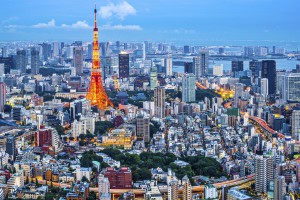Globus
Journey through Japan on this fascinating Independence by Globus itinerary. A "prefecture" and capital of Japan, Tokyo is the world’s most populous metro area and home to unlimited choices-shopping, dining, entertainment, historic temples and sites, peaceful gardens, and excellent museums. Your private guided sightseeing tour includes Meiji Shrine, a 20th-century Shinto monument built within a man-made forest; browse the bustling Nakamise Shopping Arcade; and visit one of the city’s most dazzling temples, the Asakusa Kannon Temple. You’ll also ascend the Tokyo Skytree for spectacular views over the city. During your free day, you may choose a trip to Mount Fuji. A highlight of the vacation is the shinkansen (bullet train) ride from Tokyo to Kyoto. Reaching nearly 200-miles-per-hour, this is by far the most entertaining way to travel between cities. The "cradle" of Japan’s cultural heritage, Kyoto, was the country’s capital and residence of the emperor from the 8th until the 19th centuries. Your private guided sightseeing tour includes visits to Sanjusangendo Temple, the Samurai Museum, where you can learn about Japanese history and see authentic swords and armor, and the beautiful Temple of the Gold Pavilion. Built on a lake and surrounded by a thick forest, the image of the temple’s reflection in the water is a can’t-miss photo opportunity and memorable scenic view. You’ll also walk through Gion and explore the thousands of Torii Gates at Fushimi Inari Shrine. Take some I-time for a visit nearby Nara or to explore Nishiki Market.
End your journey in Hiroshima with visits to Peace Memorial Park and Itsukushima Shrine, both UNESCO World Heritage Sites. You may consider a visit to Shukkeien Garden during your I-time.
Featured Destinations
Kyoto
Kyoto
If you can visit only one city in Japan, Kyoto is the one. This ancient city, 30 mi/50 km northeast of Osaka, was the capital of Japan for more than 1,000 years and still is considered the country's spiritual capital. Thousands of shrines and temples dot the city, including more than a dozen on the UNESCO World Heritage list. That list is far from all-inclusive, and many excellent places that might be the star attractions of other cities crowd the streets of Kyoto. It is a center of Japanese Zen and has several huge monastery complexes where serious students still sit in meditation. Kyoto is also the nation's capital of traditional arts. Whether your interest be in pottery, textiles, dance, the tea ceremony or any of the other innumerable arts, Kyoto has excellent galleries, museums, shops and tea houses. Japanese people from the countryside and foreign students flock there to learn under the great masters. Much of what is considered Japanese haute cuisine was developed there too, as an offshoot of the tea ceremony. Kyoto is Japan's heartland of history. With 1,300 years of tumultuous existence, the city's past intrudes upon the present day as in few other Japanese cities. In Gion, you can spot a geisha (or geiko, as they are called in Kyoto), one of the last hundred or so in Japan, slipping down a side-street to entertain rich guests with witty conversation, dance or music. A shopping arcade may suddenly fill with discordant clanging music as a shrine festival passes among the shoppers, or you may hear the long chant as Zen monks pass through the neighborhood, calling for alms. Kyoto is an understated city that might disappoint visitors at first (at first glance, it is a large city with modern buildings that might not align with one's original perception); its charm lies in small details, pocket gardens, tiny traditional restaurants and refined artwork.
|
Destination Guide
|
Tokyo
Tokyo
Tokyo, Japan, presents a different view at every turn. It's one of the world's main economic centers and its most populous agglomeration. The business of Tokyo is business, but you can still find harmony and small-scale gardens on back streets. Around the corner from neon and concrete, you may find the bonsai-lined courtyard of a traditional inn. Tokyo was nearly destroyed by bombs and fires during World War II, and by earthquakes at other times, but it has always rebuilt itself. As a result, there is little left of Old Japan in the city, but there's plenty of New Japan to take its place. The streets are a confusing maze, so a map is essential. The transit system is excellent, however, and there are kobans (police boxes) throughout the metropolis, as well as a populace generally willing to answer questions. Visitors to Tokyo represent both business and leisure travelers. And despite its past reputation, Tokyo is no longer fearsomely expensive. It's relatively easy to visit Tokyo on a budget.
|
Destination Guide
|
Hiroshima
Hiroshima
Hiroshima in southwestern Honshu has grown rapidly as a commercial city, and after 1868 it was developed as a military base. Every August 6 since 1947, thousands participate in multidenominational services in the Peace Memorial Park built on the site where the bomb exploded. After the war the city was largely rebuilt, and commercial activity gradually resumed. Visit the Peace Park but also explore Miyajima Island and its colourful shrines and mysterious forests.
|
Destination Guide
|
View Full Itinerary
Valid Date Ranges






